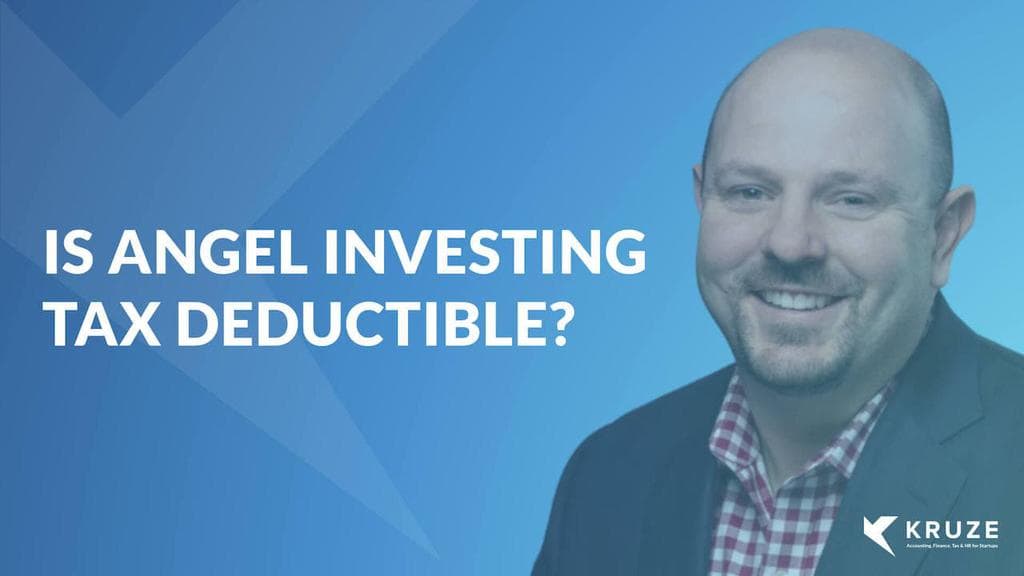
While sometimes it may feel like you’re giving money to charity as an angel investor, that’s not how it works for tax purposes. Money you invest as an angel investor is not tax deductible like a charitable gift. It’s more complicated. However, since we wrote this piece in late 2021, there have been several states that have come out with “angel tax credits” - which means that there may be state level tax opportunities.
Angel investing is the heart and soul of the startup/venture capital ecosystem. The reason people do it is that when you invest in a good company early at a very low valuation, you can make lots of money if the company goes to an IPO or gets acquired for a big valuation. But not every company is a success. And angel investors end up losing money on some companies. The gains on successful companies will hopefully more than balance out losses on others, and the process continues.
Applying taxes to angel investing
So how do taxes figure into that process? Let’s start with some high-level background. People make money in two ways: ordinary income, from wages or interest; and capital gains, where you sell something for more than you paid for it. Both of those sources of money are taxable, at different rates, through income taxes and capital gains taxes.
Making Money - Not Tax Deductible; Losing Money - Decrease Your Taxes
Angel investing falls into the capital gains tax bucket, so that is where it will hit the amount you have to pay to the government. If you invest in a startup, and it gets sold, and your share is worth a lot more money than you paid, you’ll pay capital gains taxes on that amount. What happens when you lose money, though? Well, in those instances your loss is tax deductible. You’re generally allowed to use those capital losses to offset any capital gains.
To look at a simple example: An angel investor puts $1 million in two different startups. Startup A fails, is shut down, and the $1 million is lost. Startup B is successful, and the angel investor receives $2 million from the company’s sale. The investor owes no capital gains – the $1 million loss on the unsuccessful startup offsets the $1 million capital gain on the successful startup. Or to look at it another way, the angel investor started with $2 million and ended with the same amount. No capital gains taxes are due.
What’s the advantage of angel investments?
But that’s not really why people make angel investments. Angel investors hope for large gains, but capital gains generate taxes. If Startup B is sold and the investor receives $10 million, the investor now owes capital gains tax on $8 million [$10 million - ($1 million initial investment + $1 million capital loss on Startup A)].
The most common tax benefit for angel investors - QSBS
There is also a tax benefit for investors who buy qualified small business stock (QSBS) which can help investors shield up to $10 million in capital gains in some circumstances. You can read more about QSBS here. The basic summary is that if the startup - and you, the investor - meet some very specific qualifications you may be able to avoid some serious capital gains at the federal level.
Typically angel investors invest in several different startups hoping that one or two will be successful. The ones that aren’t successful create capital losses that are tax deductible, and those can be used to offset gains on the companies that are thriving. Your accountant may need you to provide proof that a company shut down and didn’t make it.
State Level Angel Tax Deductions - Angel Tax Credits
Since we first wrote this article, a number of states have created “angel tax credits” - of course, the state with the most angel investments, California, does not have this credit!
The credits vary in terms of their eligibility requirements, credit rates, and maximum credit amounts. The credit rates and maximum credit amounts for angel tax credits also vary from state to state. Most states offer a credit rate of 20-30% of the investment amount. The maximum credit amount typically ranges from $50,000 to $250,000 per year.
Tax Implications of Investing in Startups: What You Need to Know
Investing in startups can be a lucrative venture, but it also comes with its own set of tax implications that you should be aware of. Understanding these can help you make informed decisions and optimize the amount you pay to the federal and state governments. Below are key points you should consider; note that you should always consult with your CPA to get current and localize advice:
Types of Income and Their Tax Rates
When you invest in a startup, the returns usually come in the form of capital gains. These gains are taxed differently than ordinary income like your salary. Short-term capital gains are taxed at your ordinary income tax rate, while long-term capital gains benefit from lower tax rates.
Using Capital Losses to Offset Gains
If one of the startups you invested in doesn’t pan out, you can use the capital loss to offset your capital gains from other investments. This can significantly reduce your tax liability. For example, if you gain $100,000 from one startup but lose $40,000 in another, you would only owe taxes on the net gain of $60,000. This is one way you can deduct angel investments from your taxes.
The Impact of Holding Period
The length of time you hold your investment matters. If you hold the startup stock for long enough, any gains will be considered long-term and subject to a lower tax rate. Conversely, if you sell quickly, the gains are short-term and taxed at your higher, ordinary income rate. Hold periods matter, although they have occasionally changed, so again, talk to your CPA.
Qualified Small Business Stock (QSBS) Exclusion
As previously mentioned, investing in Qualified Small Business Stock (QSBS) can offer substantial tax benefits. If you - and the company you invest in - meet specific criteria, you can exclude up to $10 million or 10 times your basis in the stock from federal capital gains tax.
Reporting Requirements
Don’t underestimate the importance of proper documentation. You will need to report your gains and losses accurately to the IRS, usually on Schedule D of your tax return. Keep records of your transactions to substantiate your claims. This is very important - keep track of everything.
Consult a Tax Professional
Given the complexity of the rules around startup investments, it’s advisable to consult a CPA experienced in this area. They can help you navigate the intricacies and take advantage of tax-saving opportunities. Note that Kruze is focused on serving corporations, not individuals, and this information is not to be taken as any sort of tax or accounting advice.
Actionable Takeaways:
- Always keep records of your startup investments for tax reporting.
- Consider the holding period of your investment to take advantage of lower long-term capital gains rates.
- Look into QSBS benefits if you meet the criteria, as they can offer significant savings.
- Consult a CPA who understands startup investing for personalized advice tailored to your specific circumstances.
Kruze is an expert at startup corporate taxation. If you have more questions about angel investing or how it impacts your taxes, let us know, we’d love to refer you out to a CPA who is an expert (but note that it’s NOT us, we stay focused on corporate taxes.) If you want to learn more about taxes and early-stage startups, visit our startup tax return page.












